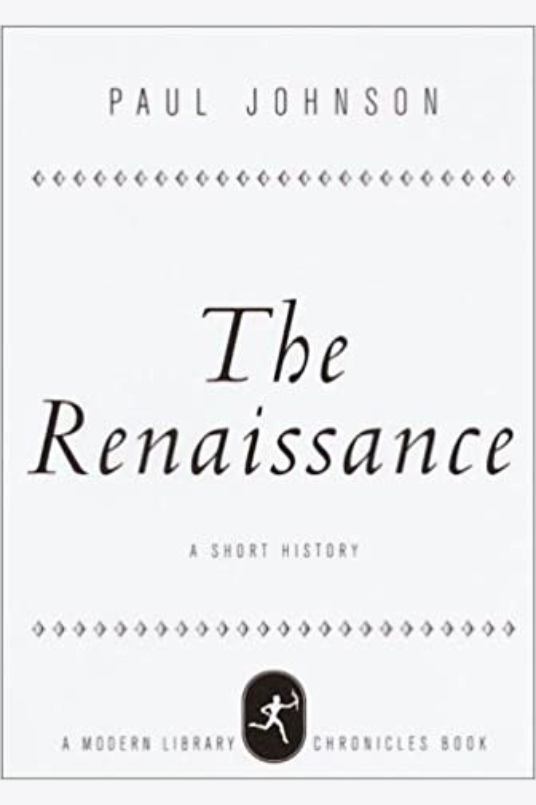As I’ve said before, Paul Johnson’s books are a great way to get started with reading about history. He keeps it short and sweet.
Flow: 5/5
Actionability: 3/5
Mindset: 5/5
Some of My Highlights:
“Needless to say, it is not those who actually live through the period who coin the term, but later, often much later, writers.”
“The usage stuck because it turned out to be a convenient way of describing the period of transition between the medieval epoch, when Europe was ‘Christendom,’ and the beginning of the modern age.”
“If the term has any useful meaning at all, it signifies the rediscovery and utilization of ancient virtues, skills, knowledge and culture, which had been lost in the barbarous centuries following the collapse of the Roman Empire in the West, usually dated from the fifth century A.D.”
“The new universities were the core of what we now call the twelfth-century renaissance, and it is particularly significant that an arts faculty existed in Oxford as early as the 1120s because such courses provided the foundation for the true Renaissance more than two hundred years later.”
“The early church fathers regarded Aristotle with suspicion, ranking him as a materialist, in contrast to Plato, whom they saw as a more spiritual thinker and a genuine precursor of Christian ideas.”
“The Ethics became available in Latin translation about 1200 and the Politics half a century later…”
“The Roman Empire was a monumental physical, legal, and military fact, gathering and spending vast sums of money, from which the arts and literature incidentally benefited.”
“The Romans knew about the water-powered mill, and they made some large specimens. But they were slow to build mills, preferring slaves, donkeys and horses to supply power; Vespasian, emperor A.D. 69-76, was even said to have opposed the extension of waterpower because it would throw men out of work.”
“Thus in the later Middle Ages, wealth was being produced in greater quantities than ever before in history, and was often concentrated in cities specializing in the new occupations of large-scale commerce and banking, like Venice and Florence.”
“But wealth alone would not have produced the phenomenon we call the Renaissance.”
“There was one respect in which the growth of intermediate technology had a direct, explosive effect on this cultural spread. Indeed, it was the most important cultural event by far of the entire period. This was the invention, followed by the extraordinarily rapid diffusion, of printing.”
“Efficiently produced, paper was cheaper than any other writing material by far.”
“The key novelty, however, was the invention of movable type for letterpress, which has three advantages: it could be used repeatedly until worn out; it could be easily renewed, being cast from a mold; and it introduced strict uniformity of lettering.”
“In 1450 Gutenberg began work on a printed Bible, known as the Gutenberg Bible or the Forty-two Line Bible (from the number of lines on a page), which was completed in 1455 and is the world’s first printed book.”
“But France could produce no Dante, which was probably decisive in the battle of tongues.”
“Painters, sculptors and architects were encouraged to compete among themselves for contracts, and still more for glory.”
